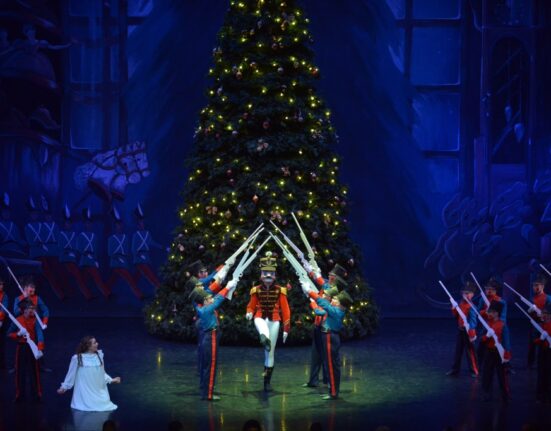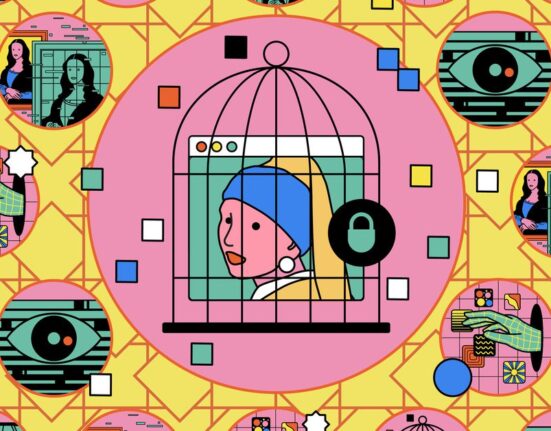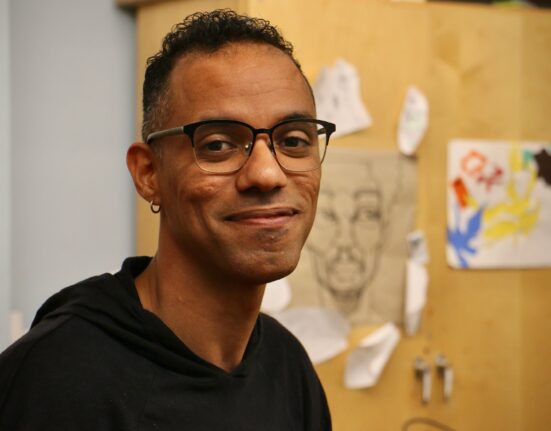Enanka Art Gallery is more than just a space; it is a weekend haven where people escape to nurture their artistic talents and reconnect with their creative sides.
The gallery is alive with activity. Each corner buzzing with the hum of creation.
Painters are gathered on one side, their canvases slowly coming to life with every stroke, while those moulding clay occupy the centre, their hands working the malleable material into forms of their imagination.
Children, accompanied by their parents, sit on the other side, their faces lit up with excitement as they bring their wildest ideas to life with paint and clay.
Every adult holds a glass of wine—red or white, though the crisp, clear white seems to be the drink of choice for many. Meanwhile, the children sip on juice, the occasional crunch of snacks breaking the quiet focus as they concentrate on their masterpieces.
Reconnecting hub
In one corner, a group of friends sits at a table, their laughter and chatter interspersed with moments of concentration as they engage in their art.
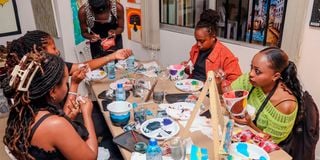
Art lovers paint their creations during the pottery class at Enanka Art Gallery in Nairobi on August 17, 2024.
Photo credit: Bonface Bogita| Nation Media Group
For them, this event is not just about art, it’s a rare chance to come together, to share in each other’s company amidst their otherwise hectic lives.
One of them is Joan Njeri, a social media strategist and co-founder of ‘Two on Social,’ a social media management agency that champions women’s brands.
Shares her experience.
“It’s my first time here, but I have done paint-and-sip before,” she says, her eyes reflecting the excitement of new experiences.
“Painting is a form of creativity that lets me see where my mind is at.
“My job demands a lot of creativity, so this is a way to channel that energy. It’s different from scrolling through my phone, which feels like work. This is how I take a break, a real one, away from the digital world,” she adds.
Three years ago, Joan celebrated her 21st birthday with a paint-and-sip, sparking an interest in art that she revisits whenever time allows.
“It is not consistent,” she admits, “but it’s something I do to break away from work and connect with myself.” Her friend, Sharon Jerotich, who works in PR and Marketing, adds her perspective.
“I am here to spend time with my friends,” she says with a smile.
“Painting is not something I would usually go out of my way to do, but once you start, it is fun. I like activities where we can still talk and hang out while doing something.
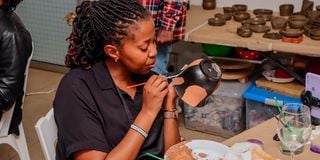
Joan Njamah does Pottery painting pictured during Hands on Pottery workshop at Enanka Art Gallery in Nairobi on August 17, 2024.
Photo credit: Bonface Bogita| Nation Media Group
“It is different from going to the movies, where there are so many restrictions. Plus, the wine helps!” she adds.
Across the table, Prudence Wairimu, a makeup artist, also reflects on her experience.
“This is not exactly a break from my job,” she explains, “because makeup requires concentration too. But it is art, and I love that. It’s my first time doing this, and I am enjoying it, even though I get distracted easily. “Focusing on one thing is new for me.”
Grace Muthoni, who is also a cofounder at ‘Two on Social,’ attests that the event is a stress reliever, though her inner perfectionist is hard at work.
“Everything needs to be perfect,” she laughs, “but it is nice because I can just follow the lines and let go. In your 20s, it is rare to find friends who want to do something creative rather than going out until 2 am and regretting it the next day.
“This is refreshing, a chance to have meaningful conversations and grow together, “says Grace.
Clay and pottery
In the centre of the room, where the pottery wheels hum softly, is Mude Mbiru, a 25-year-old prospective artist. Mude is working on an ambitious piece of hands holding a pot.
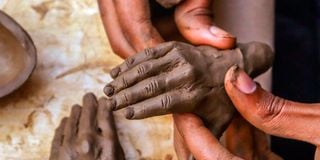
Mude Mbiru’s clay hands during the Hands on Pottery workshop at Enanka Art Gallery in Nairobi on August 17, 2024.
Photo credit: Bonface Bogita| Nation Media Group
“As cliché as it sounds, I feel like art chose me,” Mude says, his hands steady as he shapes the clay. “I’ve been playing with plasticine since I was a child, and I never stopped, even when others moved on to different things. I always have a bit of plasticine in my pocket, ’he says.
“Art is in everything. An example can be from how you cook, how you walk to the shop. It’s all art,” he adds.
Mude’s attests of his favourite piece, a lion sculpted from plasticine, holds a special place in his heart.
“It was my first large piece, and it broke apart due to the temperature which is a common issue with plasticine. But when I put it back together, it looked even better than before. That is the beauty of art; it proves to get better with constant persistence.”
Growing up, Mude was fortunate to have parents who supported his artistic pursuits. Reflecting on their encouragement, he says, “It is because I was very persistent. There is a difference between passion and persistence. I did not just enjoy it, I did it consistently and improved on it.”
He did not realise the stigma surrounding careers in the arts until much later.
“I did not even realise there was that stigma of heavy-weight careers compared to arts until much later when I would tell people that I like to work with plasticine, and they would relate it to the stuff that children play with and question why I am still doing ‘ childish’ things,” Mude explains.
However, in university, he studied animation and motion graphics, which offered a different perspective on art. “It is a kind of art, but very different from the physical art.
“While I enjoy that very much and think it will still be part of my artistic repertoire, there is something different about feeling the stuff in your hand,” he says.
Supporting artists like Mude is the agenda which Cynthia Otieno, the gallery manager of Enanka Art Gallery attests. Established in 2014 as an online store, Enanka became a physical gallery in 2022, providing a space where artists and art lovers can connect.
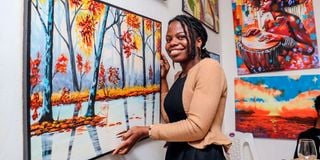
Enaka Art Gallery, Gallery Manager Cynthia Otieno pictured during Hands on Pottery workshop at Enanka Art Gallery in Nairobi on August 17, 2024.
Photo credit: Bonface Bogita| Nation Media Group
“We saw the need to involve art lovers in the experience of art, to give them a chance to see what artists do behind the scenes. It helps them appreciate the work and connects them with the artists.”
For Cynthia, Enanka is more than just a gallery; it’s a community. “We offer art classes for both children and adults,” she says.
“For Sh2,000 per session, anyone can join and unleash their creativity. They say wine helps with that,” she adds with a smile, “and I believe it does.”
Visiting artists
The event’s pottery instructor, Rana Odeh, is a visiting artist who has been working with pottery for more than seven years.
“I’ve been in Kenya for about a year now,” she shares, “and wherever I go, I find a pottery studio almost immediately. Pottery is therapeutic for me.’’
She notes the relative novelty of wheel pottery in Kenya. “Wheel pottery is a bit new in Kenya, but of course, Kenyans have been making pottery for so long with more traditional methods. Wheel pottery is just not as popular here as it is in other countries.”
Rana explains that her love for clay began in her childhood, “I have always loved clay since I was little. My friend’s mom was an artist, and it became almost like my dream job,’’ she says.
Although she did not study art in college, her Bachelor’s is in English and Philosophy, and she also has a Master’s in International and Comparative Politics which makes art very drastically different.
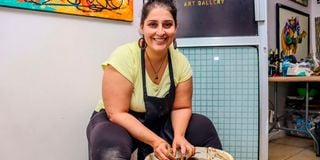
Rana Odeh pictured during Hands on Pottery workshop at Enanka Art Gallery in Nairobi on August 17, 2024.
Photo credit: Bonface Bogita| Nation Media Group
“The other stuff is great but very stressful, and I started making art to balance it all. I love pottery because it is functional art, you make pieces that are very artistic but also usable. I love drinking out of mugs I have made, soup just tastes better in my own bowls,” she laughs.
For her, pottery is deeply personal. “Pottery is a part of me. It is central to my happiness; it is almost addictive. My inspiration anytime I hold clay is to create something beautiful and useful.”



